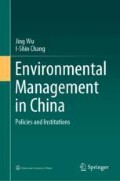Abstract
Since the early 1970s, governments in developed countries have initiated plans to transform resource-based industries into eco-friendly and less resource consumptive industries to support sustainable development. During the implementation of economic transformation plans, government leadership and high compensation payments for economic transformation have become two essential tools for ensuring the effectiveness and efficiency of economic transformation. Ecological compensation can be interpreted as the payments for ecosystem services and natural resource protection, compensation for the opportunity cost of development, payments for ecosystem damage and natural resource consumption, and the cost of environmental pollution, which is paid through monetary or economic compensation. Therefore, the ecological compensation mechanism (ECM) is an important economic means to impose restrictions on environmentally damaging development, provide economic incentives for eco-friendly development, encourage environmental protection, and establish sustainable and secure financial funds for ecological restoration and environmental remediation.
Access this chapter
Tax calculation will be finalised at checkout
Purchases are for personal use only
References
Baylis, K., Peplow, S., Rausser, G., & Simon, L. (2008). Agri-environmental policies in the EU and United States: A comparison. Ecological Economics, 65(4), 753–764.
Chang, I.-S., & Wu, J. (2011). Review on natural resources utilization in China. Management Science and Engineering, 5(2), 12.
Fang, J., Chen, A., Peng, C., Zhao, S., & Ci, L. (2001). Changes in forest biomass carbon storage in China between 1949 and 1998. Science, 292(5525), 2320–2322.
Li, W., Li, S., Li, F., & Liu, M. (2007). Discussions on several issues of forest eco-compensation mechanism. China Population, Resources and Environment, 17(2), 6.
Pagiola, S., Arcenas, A., & Platais, G. (2005). Can payments for environmental services help reduce poverty? An exploration of the issues and the evidence to date from Latin America. World Development, 33(2), 17.
Peng, X. (2011). China’s demographic history and future challenges. Science, 333(6042), 581–587.
Rondeau, D., & Bulte, E. H. (2007). Wildlife damage and agriculture: A dynamic analysis of compensation schemes. American Journal of Agricultural Economics, 89(2), 490–507.
Tang, M., Zhong, D., Ding, S., Peng, Y., Yu, T., & Xiao, J. (2009). Poyang lake area construction of a new mechanism for ecological compensation. Guangdong Chemical Industry, 11(39), 2.
Wang, G., Innes, J. L., Lei, J., Dai, S., & Wu, S. W. (2007). China’s forestry reforms. Science, 318, 2.
Yang, H. (2004). Land conservation campaign in China: Integrated management, local participation and food supply option. Geoforum, 35(4), 507–518.
Yin, R., & Yin, G. (2010). China’s primary programs of terrestrial ecosystem restoration: Initiation, implementation, and challenges. Environmental Management, 45, 13.
Zhang, P., Shao, G., Zhao, G., LeMaster, D. C., Parker, G. R., John, J., et al. (2000). China’s forest policy for the 21st century. Science, 288, 2.
Author information
Authors and Affiliations
Corresponding author
Rights and permissions
Copyright information
© 2020 Chemical Industry Press and Springer Nature Singapore Pte Ltd.
About this chapter
Cite this chapter
Wu, J., Chang, IS. (2020). Ecological Compensation. In: Environmental Management in China. Springer, Singapore. https://doi.org/10.1007/978-981-15-4894-9_16
Download citation
DOI: https://doi.org/10.1007/978-981-15-4894-9_16
Published:
Publisher Name: Springer, Singapore
Print ISBN: 978-981-15-4893-2
Online ISBN: 978-981-15-4894-9
eBook Packages: Earth and Environmental ScienceEarth and Environmental Science (R0)

